Jozef Venglos remembered: The trailblazer who baffled Aston Villa – and changed English football
Former Aston Villa and Celtic manager Jozef Venglos has died, aged 84. He became the top flight's first foreign gaffer in 1990, introducing ideas that are common today – but were revolutionary at the time
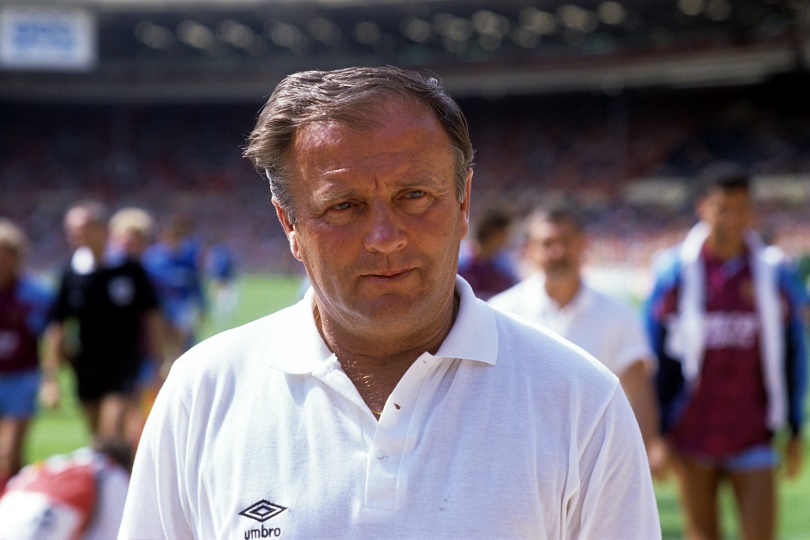
When Arsene Wenger arrived at Arsenal in October 1996, the bespectacled Frenchman was hailed as a revolutionary – a man whose methods would not only shake up the English game but ultimately shape its future, too. Aston Villa’s players and fans, though, were probably wondering what all the fuss was about. After all, they’d seen it all before, during the brief and somewhat calamitous reign of the top flight’s first foreign manager.
NEWS Former Aston Villa and Celtic boss Jozef Venglos dies aged 84
Following the departure of England-bound manager Graham Taylor in 1990, Villa chairman ‘Deadly’ Doug Ellis was left searching for a suitable replacement for a man who had just led the Birmingham giants to second place in the old First Division. Gerry Francis, Arthur Cox and David Pleat were among the front-runners in what was assumed to be an all-English race. Ellis, however, had other ideas.
This feature originally appeared in the October 2015 issue of FourFourTwo. Subscribe here and save 53%
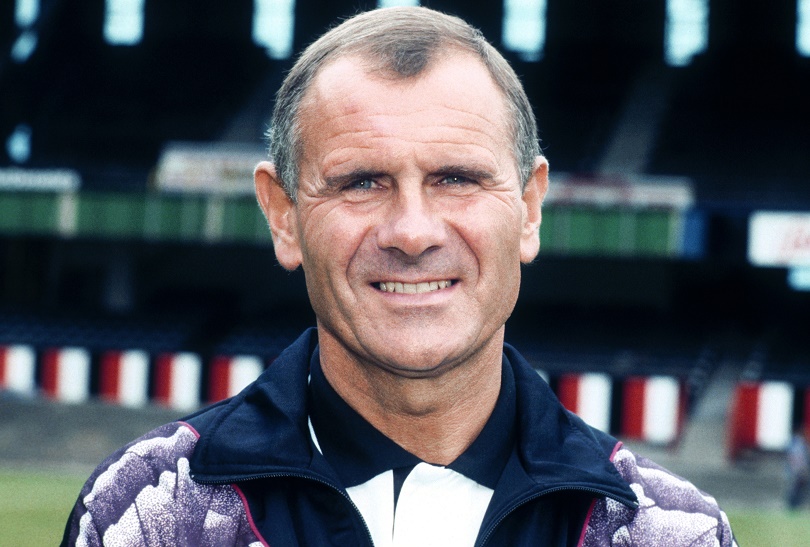
“When Southampton unveiled Kevin Keegan [in 1980] they had managed to keep it absolutely secret until Kevin Keegan walked in to greet open-mouthed journalists,” Ralph Ellis, the Daily Star’s man in the Midlands in 1990, tells FourFourTwo. “Doug clearly fancied doing something similar. We were there for the new manager’s arrival but had no idea who it was. Doug’s memorable introduction was: ‘Does anybody know who this is?’ There was widespread silence.”
"We have got the top man in Europe,” he purred. “He is simply the best."
His mystery man was Dr Jozef Venglos, a 54-year-old Czechoslovakian (the Czech Republic and Slovakia wouldn’t become two until 1993) with a doctorate in physical education and a passion for philosophy. A household name he wasn’t, but that didn’t deter a gleeful Ellis. “We have got the top man in Europe,” he purred. “He is simply the best.”
Smiling, the fatherly-looking Venglos had the appearance of a man who relished the challenge of continuing the good work started by the more old-school Taylor. Ellis warned, however, that despite the amiable exterior his new man possessed ‘an iron fist inside a velvet glove’. With the Iron Curtain still hanging resolutely (albeit precariously) around the communist Eastern Bloc, it was entirely suitable rhetoric from the chairman.
Get FourFourTwo Newsletter
The best features, fun and footballing quizzes, straight to your inbox every week.
But this was one revolution that English football wasn’t quite ready for.
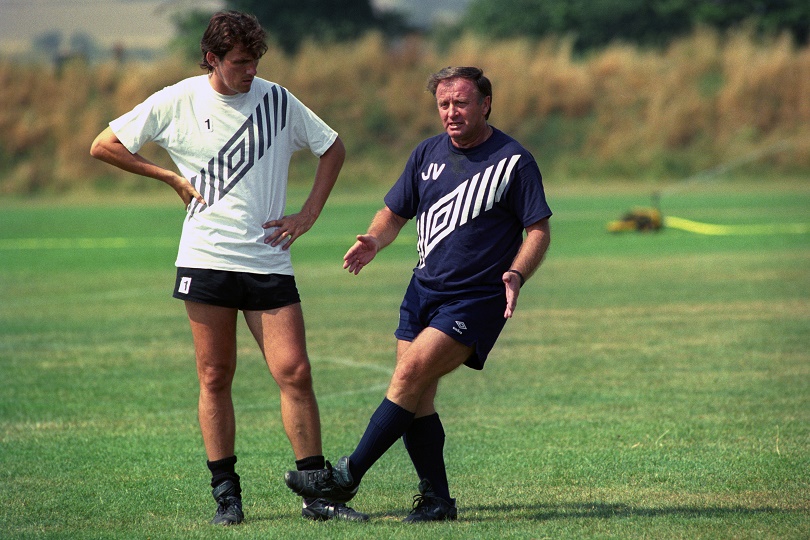
In terms of nutrition he was ahead of his time, particularly in English football
The summer of 1990 had provided English football with a much-needed shot in the arm. England had not only reached the last four of the World Cup for the first time since 1966 but, domestically, the country’s top clubs were preparing to re-enter European competition after five largely miserable years of continental isolation following the Heysel disaster in 1985. Villa were one of them, having qualified for the UEFA Cup, while Manchester United were preparing to do battle in (and win) the European Cup Winners’ Cup.
Little wonder Venglos was excited. Fresh from leading Czechoslovakia to the quarter-finals of the World Cup in Italy – where they lost to eventual champions West Germany through a Lothar Matthaus penalty – he wasted no time in getting metaphorical.
“It has been like having bread with no butter without the English clubs in Europe,” he said. The dairy product was soon on his hit list at the club’s Bodymoor Heath Training Ground, though. “In terms of nutrition he was ahead of his time, particularly in English football,” says Tony Daley, the former Villa and England winger who played under Venglos in 1990-91. “I remember eating steak and chips the night before the game when I first started playing. That went out of the window overnight.”
The similarly well-travelled Venglos thought along the same lines, but while Wenger was hailed as a forward-thinker, the Czechoslovakian, six years earlier, was derided as a crank
Dietary regimes hadn’t previously been a staple of the English game, a fact probably best summed up by Tony Adams in an interview in Jasper Rees’ biography of Wenger back in 2003. “We were always concerned about our diet,” said Adams, after revealing he had been burying his nose in a book entitled Eat to Win as far back as 1987. “It just so happened that I would be going out on a Saturday night and putting 30 pints of lager down my neck over the weekend.”
When the Frenchman arrived at Highbury in 1996, he brought with him a wealth of dietary knowledge acquired in Japan, where boiled chicken, steamed fish and raw vegetables were very much the order of the day. The similarly well-travelled Venglos thought along the same lines, but while Wenger was hailed as a forward-thinker, the Czechoslovakian, six years earlier, was derided as a crank – often by members of his own team.
“In all sports, players like to have things the same way,” says former Villa striker Peter Withe, who joined Venglos as his assistant midway through the manager’s sole season at the club. “What Graham [Taylor] did was the British way and the players were comfortable with that. So when this new philosophy was introduced around training, diet and drinking, some players resented it. They shut it out.”
Daley agrees, telling FFT that some of the club’s older players struggled to adapt to being told what they could and couldn’t shove down their throats. “I’m not saying there was a drinking culture, but the boys would go out for a midweek drink pretty regularly,” he says. “Other players at other clubs did exactly the same. The guys who had played 400 matches saw little reason why they should suddenly change their habits.”
"We want to play fairly and in the right spirit,” he said. “Although the result is vital, the spirit of soccer comes above all else."
Born in February 1936 in Ruzomberok, in what is now northern Slovakia, Venglos enjoyed a successful playing career with Slovan Bratislava before beginning his coaching career Down Under, first with New South Wales and then with the Australian national team. In 1976, he worked under Vaclav Jezek with the Czechoslovakian side that shocked Germany to win the European Championship in Yugoslavia, courtesy of a dinked penalty by Antonin Panenka. It was that triumph that truly established Venglos, although the qualifying campaign for the tournament had also provided evidence of his growing stature.
Drawn in the same group as England, Czechoslovakia beat Don Revie’s side 2-1 on a dismal October night in Bratislava to strike a decisive blow in qualification for the four-team tournament (as it was then) the following year. Speaking before the game at Wembley earlier in the campaign, Venglos provided an insight into his philosophy. “We want to play fairly and in the right spirit,” he said. “Although the result is vital, the spirit of soccer comes above all else.”
Those comments hardly suggested he was the right man for the blood and thunder of English league football, but back then he needn’t have worried – the chances of an English club calling on a boss born outside of these islands were as remote as the Hebrides. “I don’t want to put up an Iron Curtain in reverse but a lot of these imports are only being brought in because they are cheap,” said Gordon Taylor, the chief executive of the Professional Footballers’ Association, on the eve of the 1990-91 season.
Venglos represented the unknown; little wonder his arrival caused the ringing of further alarm bells
Thirty years on, those comments seem laughable given the disparity between the number of overseas players in the old First Division then in comparison to now, but they do serve to illustrate the insular nature of the English game post-Heysel. Deprived of European competition, English football was cut adrift culturally as well as competitively. Venglos represented the unknown; little wonder his arrival caused the ringing of further alarm bells.
Yet he wasn’t the only overseas manager in the Football League at the time, with Argentine Ossie Ardiles at Swindon Town and Uruguayan Danny Bergara at Stockport County making up this minority treble act. The South American pair had at least spent a lengthy period of time integrating themselves into the fabric of the English game. Venglos, on the other hand, was an appointment from left-field – a new and entirely surprising threat to the dominance of the homegrown manager.
“I think some of the press and the other managers found it hard to come to terms with him,” says Withe. “He was hit with loaded questions and he didn’t know where they were going to go with them. I remember going to watch a team we were due to play with Jozef. He had a small Dictaphone and used it to record comments about the opposition. A couple of managers who were sat with us thought it was hilarious and started laughing.”
Everybody was looking to see how it would go for a foreign manager, and I think anyone who was first out of the box was going to be judged more than anyone else
Described by Times journalist Dennis Shaw as “facially a Ron Atkinson lookalike but bodily only a mini version”, it was clear from the outset that Venglos would have to shoulder weighty expectations.
“Everybody was looking to see how it would go for a foreign manager, and I think anyone who was first out of the box was going to be judged more than anyone else,” Brian Little, Villa manager between 1994 and 1998, tells FFT. “I think the media were more critical of him as a result.”
Foreign or not, on the eve of the new season Venglos and Ellis knew only too well that football was a results business. Win, and the world smiles with you; lose, and you’re most definitely on your own.
At first glance the Makita Tournament – a pre-season forerunner to the endless, largely meaningless summer competitions that have followed – hardly seems a fair platform on which to form an opinion of a manager, but the headline writers wasted little time in making up their minds on Venglos.
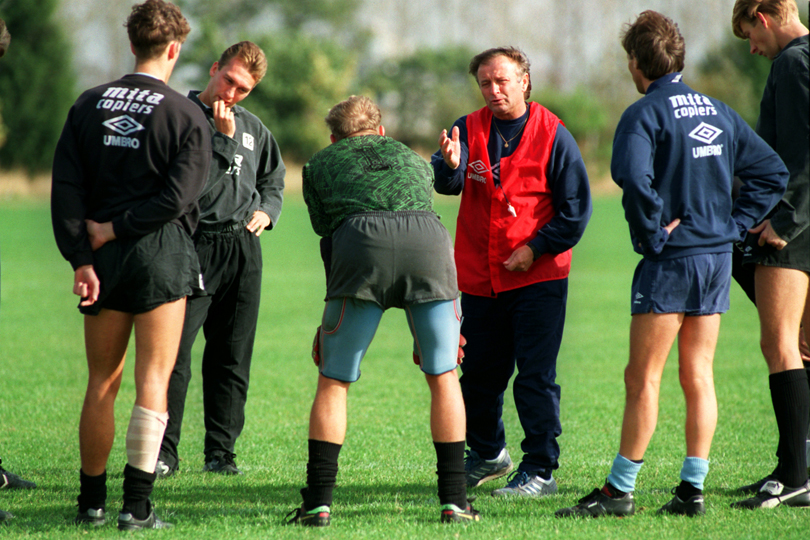
“Villa miss Taylor’s inspiration” was The Times’ take on the club’s new era, as two defeats – one to Arsenal and the other to Real Sociedad – saw Villa finish fourth of four in the Wembley sunshine. “Amid experiments with players and patterns, Venglos has apparently yet to restore the belief that was so instrumental to the club’s success under his predecessor Graham Taylor,” wrote the newspaper’s football correspondent, Stuart Jones.
With a new carbohydrate-heavy diet and the consumption of hops limited by the new manager, Villa started the season respectably, winning two and drawing one of their first five matches
Yet while Venglos’ ideas of how to play the game were taking a while to filter through, his notion of what constituted a proper pre- and post-match warm-up were gradually transforming Villa’s preparation.
“He was hugely knowledgeable,” says Daley, who was then a 22-year-old on the brink of breaking into the England side. “We had a Danish played called Kent Nielsen at Villa and I remember it being quite funny to see him going out before training sessions and doing stretches and getting himself ready. After the game he would be the last one in, doing 15 or 20 minutes of warm-downs.
“The reaction would be: ‘What on Earth is he doing?’ – but he never had an injury in his life. That was the norm on the continent at the time and within a few years it was the norm here, too. When Venglos wanted us all to do it, though, it was seen as a bit strange.”
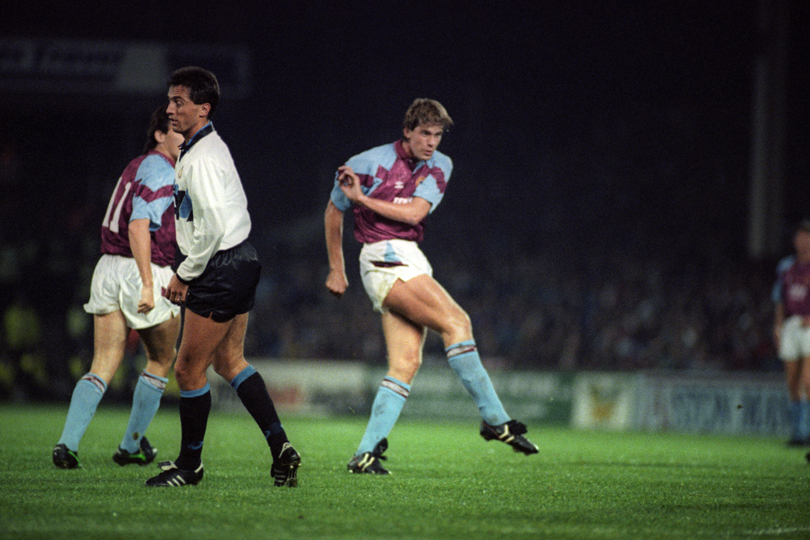
With a new carbohydrate-heavy diet and the consumption of hops limited by the new manager, Villa started the season respectably, winning two and drawing one of their first five matches before beating Banik Ostrava 3-1 in the first leg of their UEFA Cup tie at Villa Park. A 2-1 victory in Czechoslovakia set up a mouth-watering second round tie against Inter.
Villa struggled to regain any kind of form in the league and began to sink like the proverbial stone
“It was one of the great Villa Park nights,” says Ralph Ellis, who was in the press box to witness one of the club’s most memorable European games. “It was a fantastic performance.” A goal from Nielsen and a stunning second from David Platt, following a delightful pass from Gordon Cowans, secured a 2-0 win that had the national press gushing.
“Something remarkable happened at Villa Park on Wednesday night,” wrote David Miller in The Times. “An English football team, with no pretentions to sophistication, reduced a famous foreign side bristling with international players to ordinary proportions.”
Venglos himself was purring after Villa had dismantled Giovanni Trapattoni’s side, which included World Cup-winning duo Jurgen Klinsmann and Lothar Matthaus. He had, Venglos told reporters, spent the past four months trying to get Villa’s players “more confident on the ball and in their passing”. Inter themselves could testify to the fact that it was working. Miller wrote: “Here is a man who can help re-educate our football; including, perhaps, a few directors.”
But for Venglos and Villa, it proved a false dawn. After going down 3-0 at the San Siro to goals from Klinsmann, Alessandro Bianchi and Nicola Berti – ‘an incredibly naive performance’, according to Ralph Ellis – Villa struggled to regain any kind of form in the league and began to sink like the proverbial stone.
Whereas Wenger would later be afforded plenty of time at Arsenal, and unarguably inherited a far superior squad to the one Venglos was handed at Villa, the latter was on borrowed time as results refused to improve
Before the start of the season, Venglos had revealed that he had spent many a long hour while he was Czechoslovakia manager studying the training methods of Bill Shankly, Ron Greenwood and Everton’s Harry Catterick in a bid to find out why English players were such adept defenders. “Czechs have always been strong in individual creativity but not in defending,” he said. Whatever he learnt, he clearly had some trouble passing on that knowledge to a Villa side who were shipping goals at an alarming rate, as the hope engendered by a promising start to the season evaporated.
Villa won just two of 11 league matches following their capitulation in Milan, lost in the third round of the FA Cup in a replay against Wimbledon and were then knocked out of the League Cup, hammered 4-1 by Howard Wilkinson’s Leeds at the quarter-final stage. The chairman who had trumpeted his capture in the summer was beginning to look increasingly nervous. Unsurprisingly, Venglos was, too.
John Ward, who had served as assistant manager under the previous regime, left the club as part of a ‘mutual agreement’ in early January, with Withe, the club’s European Cup hero from 1982, coming in as his replacement. For some Villa fans it was merely a case of re-arranging the deckchairs on the Titanic. “A lot of them were sceptical when Dr Jo came in – they weren’t sure if he was the right man for Villa,” says Ralph Ellis. “As the second half of the season unravelled, they were proved right.”
Whereas Wenger would later be afforded plenty of time at Arsenal, and unarguably inherited a far superior squad to the one Venglos was handed at Villa, the latter was on borrowed time as results refused to improve.
He had made up his mind after the headline in the local paper which said: ‘Dr Jo Must Go’. It was sad, because he had such integrity and knowledge of the game
With Platt already eyeing a move to Italy, Venglos dipped his toe into the domestic market, signing Gary Penrice from Watford for £1m, an eye-watering sum at the time. His only previous dalliance with the chequebook had been an unmitigated disaster: sweeper Ivo Stas arrived having already scored for Villa (an own goal for Banik Ostrava in the UEFA Cup earlier in the season) but didn’t play a single game due to a troublesome Achilles.
Villa finished the season in a miserable 17th place, 35 points behind runners-up Liverpool, who occupied the same position the Midlanders had held 12 months previously. Remarkably, the trigger-happy Doug Ellis didn’t fire his gun after the club’s final game of the season against Chelsea – a 2-2 draw that saw Platt score a penalty in his last Villans appearance – with the decision ultimately taken by Venglos himself.
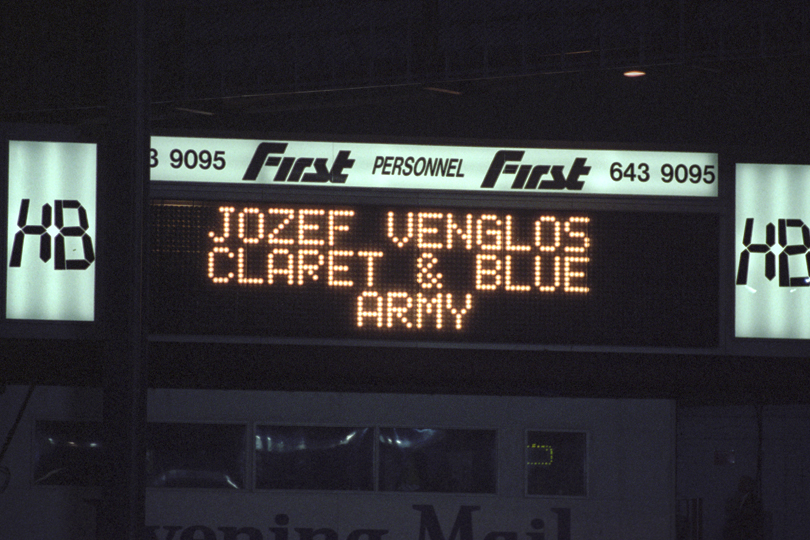
“I tried to persuade him to give it another year,” said Withe. “He had made up his mind after the headline in the local paper which said: ‘Dr Jo Must Go’. It was sad, because he had such integrity and knowledge of the game.
“I recently spoke to a well-known player at that time and he told me he thought Jozef was a nightmare. I told him that he was only really doing what Arsene Wenger did at Arsenal later in the decade – the only difference was that those players bought into it and Villa’s didn’t. He thought for a minute, then agreed.”
That headline apart, there was little crowing in the press. “I think there was an acceptance that he hadn’t failed because he was foreign but because he was simply the wrong man at the wrong time,” says Ralph Ellis.
With European borders about to be flung open in 1992, Venglos had predicted that he would be the first of many foreigners to take to the dugout. “There will be a great exchange of ideas, which can only be good for football,” he said. Aston Villa may not have seen the best of it, but there can be little doubt he was on the money.
While you're here, subscribe to FourFourTwo today and save 53%. All the exclusive interviews, long reads, quizzes and more but for less than half price...
NOW READ...
RICHARD JOLLY The curse of the Chelsea marquee signing: could Timo Werner and Kai Havertz be the cause of Lampard's sacking?
